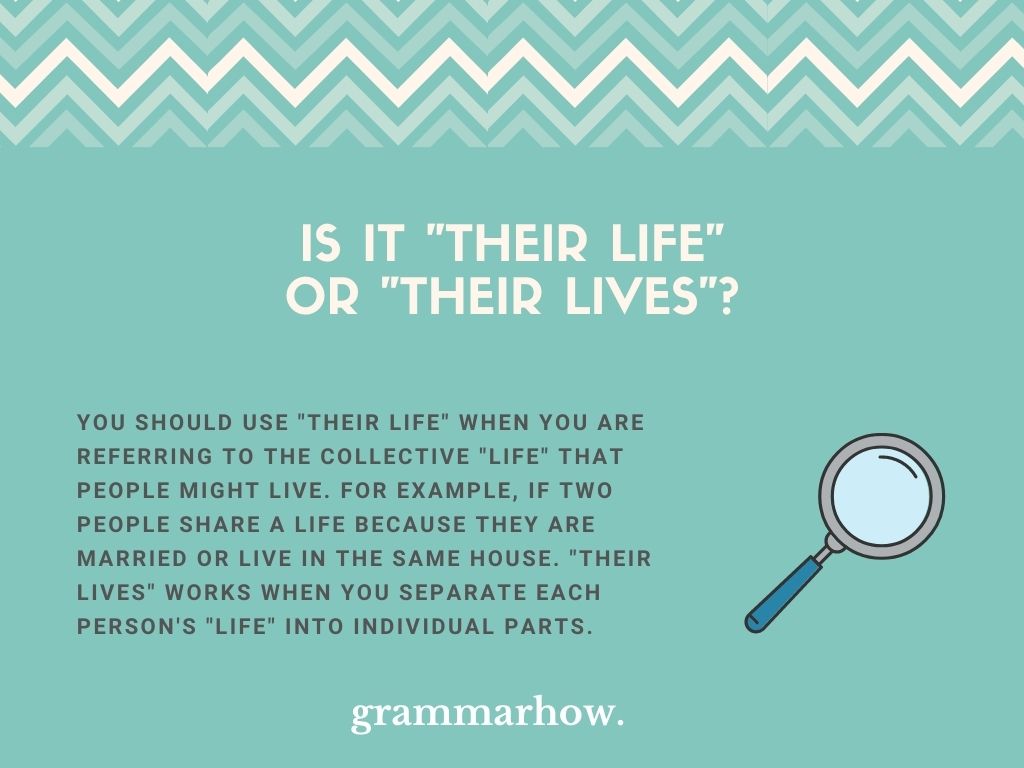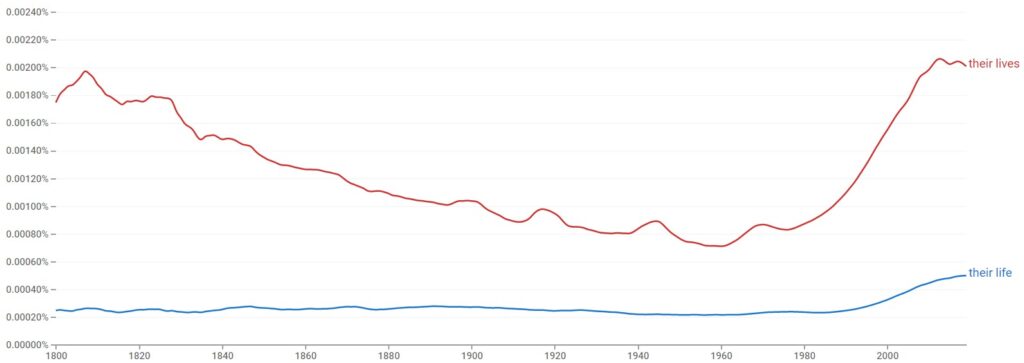When using “their life” or “their lives,” it’s helpful to know how to write about it. We need to know whether it’s a plural or singular noun, and this article will help you understand the rules.
Is It “Their Life” Or “Their Lives”?
You should use “their life” when you are referring to the collective “life” that people might live. For example, if two people share a life because they are married or live in the same house. “Their lives” works when you separate each person’s “life” into individual parts.

It all depends on how we treat the noun “life” in a sentence. We keep it singular when we refer to the same life being lived by multiple people:
- They’re happy with their life together.
But we can also turn it into a plural when we are deliberately talking about “lives” as an individual concept:
- Many people are happy with their lives, but there are those that aren’t.
When Should I Use “Their Life”?
When people share a life together, we can use “their life.” Even though “their” works to talk about a group, we can use the singular noun form of “life” to show that it’s shared amongst multiple people.
It might help if you checked out a few of these examples:
- My mom and dad are happy with their life, and I’m so happy for them.
- They should be happy with their life together! It’s not often you get a chance to do something like that.
- Their life is something that I’ve always strived to achieve, but I’ve never found someone to love me.
- I wish I had their life! It always looks so pleasant to be them.
- I can’t be in their life now. I’ve caused too many problems that are too hard to get over.
When Should I Use “Their Lives”?
“Their lives” works best when we are splitting the people’s individuality specified by “their.” Remember, “their” is a plural pronoun, so we refer to multiple people. This time, we use “lives” to show that everyone is living a different life.
This works best when the people we are talking about don’t overlap each other much. We can use this phrase to show that there are no specific connections between any of the people.
Here are some examples that might benefit you:
- Do you think their lives are better now that they’re out of the war?
- They all had to run for their lives, but none of them were sure as to why.
- Their lives have always been important to me, which is why I’ve been such a pleasant ruler.
- I think you’re playing God with their lives, and I really don’t appreciate all this experimentation.
- Their lives are not as important as our own! We must make the ultimate sacrifice!
Is “Their Life” Or “Their Lives” Used The Most?
It might help if you knew which of the two phrases is more common. Then, you’d have a better understanding of which one you’re more likely to come across.
According to Google Ngram Viewer, “their lives” is vastly more popular than “their life.” That’s because it’s much more common to split “their” and “lives” into individual people who don’t have much of a connection with each other.

It is much harder to use “their life” because we need to find two or more people who share the same life. While this works well to refer to loved ones and families, it’s still not as common in many writing contexts.
Is It “Each Other’s Life” Or “Each Other’s Lives”?
“Each other’s lives” is better because we are using “each other” to refer to the individual parties. Therefore, we must stick to the individual plural form of “lives” when we want to show that there are multiple lives being mentioned.
These examples should help you to understand more about it:
- Correct: I want us to be a part of each other’s lives.
- Incorrect: We have each other’s life in our hands now.
- Correct: If we could be in each other’s lives forever, that would be great.
- Incorrect: You won’t stay in each other’s life for long!
Does “Lives” Have An Apostrophe?
“Lives” does not have an apostrophe. It is not a possessive form (where apostrophes are most common). It’s also not a shortened form of “live is,” so we do not use it as a contraction. It is simply a plural form, where the “s” comes after “live.”

Martin holds a Master’s degree in Finance and International Business. He has six years of experience in professional communication with clients, executives, and colleagues. Furthermore, he has teaching experience from Aarhus University. Martin has been featured as an expert in communication and teaching on Forbes and Shopify. Read more about Martin here.
